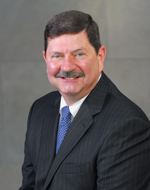Teleprompter and Cable—An Early History

Larry Satkowiak
Since teleprompters are used routinely today, you probably never wondered who developed the device. However, there are a few amusing stories about the development of the teleprompter in The Cable Center archives you might find interesting. Its origins reveals a story of entrepreneurship and opportunity among some of the most interesting personalities from the early days of cable.
In 1947, Hub Schlafly became the director of television research at 20th Century Fox. Like many young engineers and physicists of his generation, he found opportunity in the television industry, which took advantage of the research he had done during the war years. Shortly after joining Fox, he found that the Board was still not convinced about the future of television. As Schlafly reported “…One day, the Board of Directors of Fox got together for a meeting and I was sitting in the back row…Some guy on the Board—and they all lived in New York in apartments—got up and said, ‘We don’t think television is going anywhere. Who in the world would sit in a hot apartment looking at a small screen, black and white, [and] the performers have no talent, when they can go to the Roxy Theater and see a movie on the big screen, in color, with air conditioning and a soft seat? Why would they stay in their apartment to do that?’” Shortly after the meeting, Fox decided to withdraw the five applications they had pending for television stations and Schlafly began to question his future in the television business.
At about the same time, an actor named Fred Barton talked to Irving Berlin Kahn, Schlafly’s boss at Fox, about a device that would help television actors with their lines. Barton said that when he was in the Broadway play “Mr. Roberts” they repeated the same lines every night, but live television required a new script every day and that was a real problem for the actors. Schlafly was assigned to the project. He developed a prototype device made out of a suitcase with a scroll of butcher paper inside. Schlafly received a patent for the device and later won his first Emmy Award for it. When he and Kahn approached the executives at 20th Century Fox about manufacturing the device, they declined citing that they were in the motion picture business.
Kahn and Schlafly decided to leave Fox, and together with Fred Barton formed TelePrompTer, Inc. to manufacture and sell the device. The refined device was used successfully in a daytime Soap called The First Hundred Years on CBS and continued to receive attention. In 1952, they received a call from a woman from former President Herbert Hoover’s office who asked for a demonstration. At the time, Hoover was scheduled to deliver the keynote address to the Republican National Convention in Chicago. Kahn instructed Hoover in the use of the device and the President decided he would use it at the convention. The teleprompter he used was an electro-mechanical device, not electronic as we know it today. According to Schlafly, when Hoover was delivering the speech, he went off script and panicked when the teleprompter stopped, saying, “Go ahead, TelePrompTer, go ahead.” The press had no idea what he was saying and discovered what he was using. This really launched them into the business. Schlafly continued to improve the invention and won a second Emmy Award for a fully electronic version that we would recognize today.
(Larry Satkowiak is president and CEO of The Cable Center, the nonprofit educational arm of the cable industry. The Center preserves cable’s enduring contributions to society, strengthens relationships between cable and academia and unites the industry around the advancement of exceptional customer service. www.cablecenter.org)